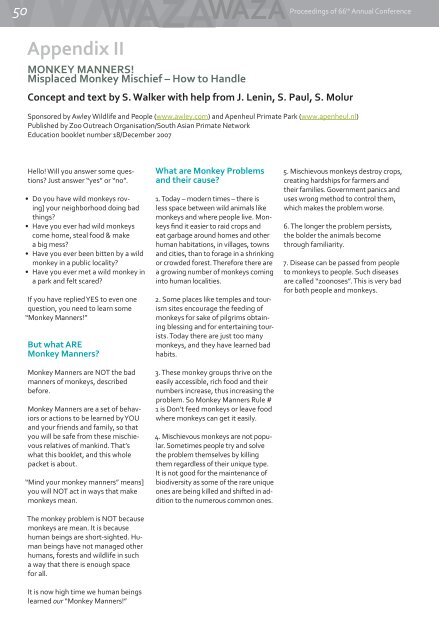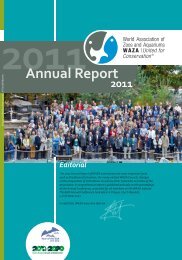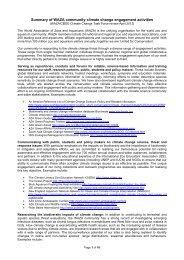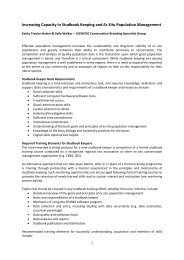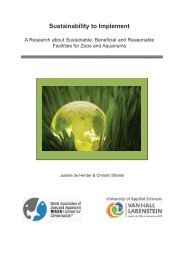Prague - WAZA
Prague - WAZA
Prague - WAZA
Create successful ePaper yourself
Turn your PDF publications into a flip-book with our unique Google optimized e-Paper software.
50<br />
Proceedings of 66 th Annual Conference<br />
Appendix II<br />
MONKEY MANNERS!<br />
Misplaced Monkey Mischief – How to Handle<br />
Concept and text by S. Walker with help from J. Lenin, S. Paul, S. Molur<br />
Sponsored by Awley Wildlife and People (www.awley.com) and Apenheul Primate Park (www.apenheul.nl)<br />
Published by Zoo Outreach Organisation/South Asian Primate Network<br />
Education booklet number 18/December 2007<br />
Hello! Will you answer some questions?<br />
Just answer “yes” or “no”.<br />
• Do you have wild monkeys roving]<br />
your neighborhood doing bad<br />
things?<br />
• Have you ever had wild monkeys<br />
come home, steal food & make<br />
a big mess?<br />
• Have you ever been bitten by a wild<br />
monkey in a public locality?<br />
• Have you ever met a wild monkey in<br />
a park and felt scared?<br />
If you have replied YES to even one<br />
question, you need to learn some<br />
“Monkey Manners!”<br />
But what ARE<br />
Monkey Manners?<br />
Monkey Manners are NOT the bad<br />
manners of monkeys, described<br />
before.<br />
Monkey Manners are a set of behaviors<br />
or actions to be learned by YOU<br />
and your friends and family, so that<br />
you will be safe from these mischievous<br />
relatives of mankind. That’s<br />
what this booklet, and this whole<br />
packet is about.<br />
“Mind your monkey manners” means]<br />
you will NOT act in ways that make<br />
monkeys mean.<br />
The monkey problem is NOT because<br />
monkeys are mean. It is because<br />
human beings are short-sighted. Human<br />
beings have not managed other<br />
humans, forests and wildlife in such<br />
a way that there is enough space<br />
for all.<br />
What are Monkey Problems<br />
and their cause?<br />
1. Today – modern times – there is<br />
less space between wild animals like<br />
monkeys and where people live. Monkeys<br />
find it easier to raid crops and<br />
eat garbage around homes and other<br />
human habitations, in villages, towns<br />
and cities, than to forage in a shrinking<br />
or crowded forest. Therefore there are<br />
a growing number of monkeys coming<br />
into human localities.<br />
2. Some places like temples and tourism<br />
sites encourage the feeding of<br />
monkeys for sake of pilgrims obtaining<br />
blessing and for entertaining tourists.<br />
Today there are just too many<br />
monkeys, and they have learned bad<br />
habits.<br />
3. These monkey groups thrive on the<br />
easily accessible, rich food and their<br />
numbers increase, thus increasing the<br />
problem. So Monkey Manners Rule #<br />
1 is Don’t feed monkeys or leave food<br />
where monkeys can get it easily.<br />
4. Mischievous monkeys are not popular.<br />
Sometimes people try and solve<br />
the problem themselves by killing<br />
them regardless of their unique type.<br />
It is not good for the maintenance of<br />
biodiversity as some of the rare unique<br />
ones are being killed and shifted in addition<br />
to the numerous common ones.<br />
5. Mischievous monkeys destroy crops,<br />
creating hardships for farmers and<br />
their families. Government panics and<br />
uses wrong method to control them,<br />
which makes the problem worse.<br />
6. The longer the problem persists,<br />
the bolder the animals become<br />
through familiarity.<br />
7. Disease can be passed from people<br />
to monkeys to people. Such diseases<br />
are called “zoonoses”. This is very bad<br />
for both people and monkeys.<br />
It is now high time we human beings<br />
learned our “Monkey Manners!”


